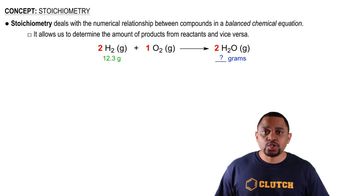Which of the following statements are true and which are false? (c) As the value of the equilibrium constant increases, the speed at which a reaction reaches equilibrium must increase.
At 1000 K, 𝐾𝑝 = 1.85 for the reaction SO2(𝑔) + 12 O2(𝑔) ⇌ SO3(𝑔) (c) What is the value of 𝐾𝑐 for the reaction in part (b)?

Verified Solution
Key Concepts
Equilibrium Constant (Kp and Kc)

Relationship between Kp and Kc

Stoichiometry of the Reaction

If 𝐾𝑐 = 0.042 for PCl3(𝑔) + Cl2(𝑔) ⇌ PCl5(𝑔) at 500 K, what is the value of 𝐾𝑝 for this reaction at this temperature?
Consider the following equilibrium: 2 H2(𝑔) + S2( 𝑔) ⇌ 2 H2S(𝑔) 𝐾𝑐 = 1.08×107 at 700°C (c) Calculate the value of 𝐾𝑐 if you rewrote the equation H2(𝑔) + 1/2 S2( 𝑔) ⇌ H2S(𝑔)
Consider the following equilibrium, for which 𝐾𝑝 = 0.0752 at 480°C: 2 Cl2(𝑔) + 2 H2O(𝑔) ⇌ 4 HCl(𝑔) + O2(𝑔) (a) What is the value of 𝐾𝑝 for the reaction 4 HCl(𝑔) + O2(𝑔) ⇌ 2 Cl2(𝑔) + 2 H2O(𝑔)?
The following equilibria were attained at 823 K:
CoO(s) + H2(g) → Co(s) + H2O(g) Kc = 67
CoO(s) + CO(g) → Co(s) + CO2(g) Kc = 490
Based on these equilibria, calculate the equilibrium constant for H2(g) + CO2(g) → CO(g) + H2O(g) at 823 K.
Consider the equilibrium N2(𝑔) + O2(𝑔) + Br2(𝑔) ⇌ 2 NOBr(𝑔) Calculate the equilibrium constant 𝐾𝑝 for this reaction, given the following information at 298 K:
2 NO(𝑔) + Br2(𝑔) ⇌ 2 NOBr(𝑔) 𝐾𝑐 = 2.02
NO(𝑔) ⇌ N2(𝑔) + O2(𝑔) 𝐾𝑐 = 2.1×1030
